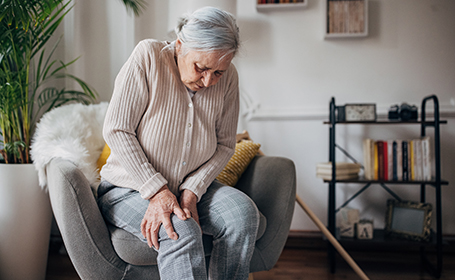
Knee arthritis Q&A
We ask a consultant orthopaedic surgeon for expert advice on the most common symptoms and types of knee arthritis, as well as what treatments are available to help manage the condition

What is knee arthritis?
Knee arthritis is a progressive painful failure of the bone surfaces and supporting bone in the knee. It's strongly associated with being overweight and ageing. Often affecting both knees, knee arthritis can limit your quality of life and the ability to walk. Over time it can also take a toll on your general wellbeing.
Are there different types of knee arthritis?
Yes there are different types of knee arthritis. 89% of knee arthritis is weight-related osteoarthritis, about 5% are from old sports injuries and about 5% are from people with very bowed or knocked knees. A very small percentage is from inflammatory arthritis such as rheumatoid arthritis. The majority are from 'wear and tear' arthritis, which is osteoarthritis, although there is no association between miles walked or run and arthritic knees.
For most people the pain comes on gradually and is often worse first thing in the morning.

What are the symptoms of knee arthritis?
A common symptom of knee arthritis is pain around the knee that is often difficult to localise. The pain is usually felt broadly at the front, but can also be on the sides and at the back of the knee and is frequently made worse on weight bearing. Some people report a clicking knee pain. The knee joint tends to feel comfortable when sitting. The knee can be warm and swollen or give way and bone spurs can be formed which are felt as knobbly lumps. The pain can also radiate down the front of the shin. For most people the pain comes on gradually and is often worse first thing in the morning.
Who is affected by knee arthritis? And how can I reduce the risk of getting a knee replacement?
The final treatment for knee arthritis is knee replacement surgery. However, the key to reducing your risk of needing a knee replacement is to keep your weight down. Your body mass index, known as BMI, should be less than 25. For most people this means eating better quality food. For example, half a 10 inch plate of leafy greens, less processed food and exercising more as well as being more active in general. The Mediterranean diet has stood the test of time as being one of the healthiest ways of eating.
Also, most smartphones can now monitor how active you've been. A helpful line in the sand is to aim for 10,000 steps a day. Less than 10,000 is sedentary, but more is a good level of daily activity. Sports injuries are difficult to prevent, but being fully fit helps and getting appropriate early treatment with a knee specialist is important. Conserving your 'cartilage', medically called a 'meniscus', helps in the long term.
 What treatments are available for knee arthritis?
What treatments are available for knee arthritis?
As mentioned, improvements can be gained from weight loss and an increase in exercise levels, which seem to have an anti-inflammatory benefit and help with muscle strengthening. Occasionally insoles can help, as well as effective anti-inflammatory supplements, such as turmeric. I'd recommend avoiding a high fat or high carb diet as this directly leads to activation of damaging cells in the knee.
The next level of treatment is injections into the knee. But these aren't sustainable in the long term.
In younger patients there can be a role for straightening the leg, which involves part cutting the bone and straightening it. This is called a realignment osteotomy.
Finally there is knee replacement surgery. Knee replacements generally have a record of lasting 10 years without having to be redone. More up-to-date knee replacements are custom made and fit precisely at surgery. They match the patient's own knee shape and can feel more like their own knee. Furthermore, the custom knees can have much better patient satisfaction, fit, alignment precision, often quicker recovery and even lower blood loss. These have been in use since 2011 and I have personally carried out over 200.
A knee replacement can significantly relieve pain and provide an improvement in quality of life.
What are the benefits of having surgery for knee arthritis?
A knee replacement can significantly relieve pain and provide an improvement in quality of life. For example, a patient can return to the simple pleasures in life, such as walking with loved ones. With a more comfortable knee, greater activity levels are possible, which has wide-ranging health and quality of life benefits.
What are the risks of having surgery for knee arthritis?
There are some medical risks which are a reflection of the patient's long term medical health.
Although very rare, there can also be risks associated with anaesthetic. However, the key risks of knee replacement are infection and thrombosis. Even rarer risks include nerve or blood vessel injury. Allergic reaction is uncommon.
Occasionally the knee can't bend enough. It's also possible for the patient to be dissatisfied and have to undergo further surgery.
Are there any alternatives to surgery?
Yes there are alternatives to surgery - surgery is always a choice. You can choose to accept your current levels of symptoms. However, active choices are weight loss, increase in exercise and muscle strength.

Tags
How do I book an appointment?
If you're concerned about symptoms you're experiencing or require further information on this subject, talk to a GP or see an expert consultant at your local Circle Hospital.